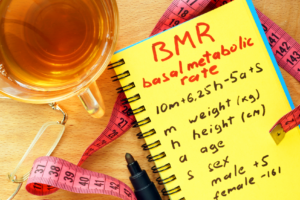
How to Sustain Calorie Deficit for Weight Loss

In a society where obesity and weight-related health problems are on the rise, creating and sustaining a calorie deficit has become a vital objective for many people looking to lose weight. Weight loss is ultimately based on the simple premise of consuming fewer calories than you exert and maintaining that deficit over time.
Table of Contents
Introduction
To attain and sustain this calorie deficit, you must make effective decisions regarding your nutrition, activity, and lifestyle. In this detailed article, we’ll look at the science and tactics for maintaining a calorie deficit for weight loss.
Understanding the Calorie Deficit For Weight Loss
A calorie deficit plays a crucial role in weight management. It is a state in which you consume fewer calories than your body requires to maintain its current weight. When you regularly sustain a calorie deficit for weight loss, your body is forced to draw on its energy reserves (mainly fat) to satisfy its daily energy needs. This leads to weight loss over time.
Understanding the link between calories taken (caloric intake) and calories expended (caloric expenditure) is the key to successful weight loss through a calorie deficit.

- How to Determine Your Basal Metabolic Rate (BMR)
Your BMR is the number of calories your body needs to function normally, such as for breathing, circulation, and cell synthesis. There are several formulas for estimating BMR, the most common of which is the Harris-Benedict equation. Age, gender, weight, and height are a few factors that affect your BMR.

- Calculate Your Daily Energy Expenditure (TDEE)
TDEE accounts for all of the calories your body requires, taking into account your degree of activity. It is computed by multiplying your BMR by a factor based on your activity level. There are several levels of activity, ranging from inactive (little to no exercise) to very active (daily intense exercise). Your TDEE is the total number of calories required to maintain your current weight.

- Make a Calorie Deficiency
You must consume fewer calories than your TDEE in order to lose weight. A frequent recommendation is to aim for a daily calorie deficit of 500 to 1,000, which can result in a weight loss of 1 to 2 pounds each week. Keep in mind that losing weight too quickly can be harmful to your health.
Techniques for Maintaining a Calorie Deficit
You need to follow the below-mentioned techniques for maintaining a calorie deficit for weight loss.
- Keep Track of Your Caloric Intake
The core element of maintaining a calorie deficit is keeping a close eye on your caloric intake. Several practical ways can assist you in accomplishing this:

Food Record: One of the most efficient strategies to track your caloric consumption is to keep a complete food record. It enables you to keep a detailed record of everything you ingest. Jotting down everything from your morning coffee to late-night munchies gives you a comprehensive picture of your eating patterns. Furthermore, several contemporary tools can make this procedure easier. Smartphone apps and websites provide easy-to-use platforms for digital meal diaries. They allow you to enter your meals, snacks, and beverages, and they frequently provide useful information about your daily calorie consumption.

Calorie Counting Applications: Calorie counting applications like MyFitnessPal and Lose It! are great for people who prefer a more automatic approach. are fantastic tools. These apps include extensive databases of foods and their associated calorie content. Simply search for the food item you ate, enter the amount, and the app will calculate the calories for you. Furthermore, these apps let you set and track calorie goals to ensure that you stay within your desired deficit range.

Weigh and Measure: When estimating portion sizes and calorie content, precision is essential. Using kitchen scales, measuring cups, and measuring spoons to weigh and measure your food can help ensure accuracy. You acquire a more realistic grasp of the calories you consume by quantifying your servings. This strategy is particularly useful when dealing with things that are difficult to quantify, such as homemade recipes or oddly shaped goods.
- Choose Nutrient-Rich Foods
When it comes to maintaining a calorie deficit, the quality of the calories you consume is just as essential as the quantity. Prioritizing nutrient-dense foods ensures that you get the vitamins, minerals, fiber, and protein you need while keeping your calorie intake under control. A closer look at the components of the nutrient-rich yet best calorie deficit diet for weight loss follows:

Lean Proteins: Including lean protein sources in your diet is critical for maintaining muscle mass and promoting a feeling of fullness. Options such as chicken, turkey, fish, lean beef, tofu, and lentils are not only protein-rich but also lower in calorie density compared to their higher-fat equivalents. These foods not only provide amino acids for muscle repair and growth, but they also provide a longer release of energy, which can help you feel fuller for longer.

Whole Grains: Whole grains like brown rice, quinoa, whole wheat pasta, and oats are packed with fiber, which aids with digestion and keeps you feeling full. Fiber also helps maintain blood sugar levels, preventing energy dumps and lowering cravings. The vitamins and minerals in whole grains help with overall health, making them a nutritious choice that supports your calorie deficit quest.

Fruits and Vegetables: The colorful array of fruits and vegetables delivers a plethora of vitamins, minerals, and fiber with relatively few calories. The fiber in these foods improves satiety, while the vitamins and minerals add to overall well-being. Fruits and vegetables might be a dieter’s best friend as they can be consumed in liberal quantities, satisfying your appetite without an excessive calorie burden.

Healthy Fats: While it might seem a little unusual, adding healthy fats is vital for the best calorie deficit diet for weight loss. Avocado, nuts, seeds, and olive oil all include important fats that are necessary for many body functions, including the absorption of fat-soluble vitamins. The trick is moderation; these foods are high in calories, so portion control is essential.

Low-Fat Dairy: If you want dairy products, choose low-fat or fat-free varieties. They provide calcium and protein without the extra calories and saturated fats found in full-fat dairy products. Calcium aids bone health, whereas protein aids satiety, muscle maintenance, and repair.
- Beware of Portions

Maintaining a calorie deficit entails more than just eating healthy foods; portion control is also essential. When ingested in excess, even healthful meals can cause weight gain. Here are some excellent portion control strategies:
Use Smaller Plates: Using smaller plates and bowls while consuming the best calorie deficit diet for weight loss can give the impression that you’re eating more than you are. This tricks your mind into thinking you’re eating a filling meal, even when the portion size is lowered. It’s a simple yet efficient approach for controlling overeating and making it easier to maintain a calorie deficit.
Avoid Mindless Eating: Distracting yourself with activities such as watching TV or working on the computer during meals can lead to mindless eating. When your attention is divided, it is difficult to identify fullness signs, which may lead to overeating. Instead, concentrate on your food, savoring each bite, and pay attention to your body’s hunger and satiety cues.
Share Dishes: Eating out frequently results in large quantities that might ruin your calorie deficit attempts. Consider splitting entrees with a companion when dining out. This not only allows you to try new menu items, but it also minimizes portion sizes, making it easier to stick to your calorie budget.
- Try Intermittent Fasting

Intermittent fasting (IF) is an eating pattern that has gained popularity due to its ability to help individuals maintain a calorie deficit, hence helping weight loss. This strategy involves alternating between eating and fasting intervals and comes in a variety of formats. Here’s a look at some popular intermittent fasting methods:
16/8 Method: One of the most popular techniques for intermittent fasting is the 16/8 method. It entails fasting for 16 hours and eating all of your calories within an 8-hour period. For example, you may forgo breakfast and start eating around noon, then finish by 8 p.m. This strategy often allows for larger meals during the eating window, which can help to maintain a sensation of fullness while being in a calorie deficit.
5:2 Approach: The 5:2 approach involves eating regularly five days a week and severely reducing your calorie intake (typically about 500-600 calories) on the other two days. These low-calorie days result in a considerable calorie deficit and, when done carefully, can result in weight loss. This strategy allows you to choose which days to limit your calorie consumption based on your schedule and preferences.
Eat-Stop-Eat: Eat-Stop-Eat entails fasting for 24 hours once or twice a week. For example, you may finish dinner at 7 p.m. and not eat again until 7 p.m. the next day. While this strategy may appear difficult, it can be helpful for some people. Extended fasting periods lower calorie intake dramatically, perhaps resulting in a calorie deficit and weight loss.
- Avoid Liquid Calories
It’s crucial not to ignore the calorie content of beverages when trying to sustain a calorie deficit. Liquid calories can be a source of extra energy that might sabotage even the best calorie deficit diet for weight loss. Consider the following ways to properly regulate your calorie intake:
Choose Calorie-Free or Low-Calorie Drinks: Make a conscious decision to drink beverages that are either calorie-free or low in calories. Water, herbal tea, and black coffee are all terrific hydration options that don’t add a lot of calories to your diet. These choices satisfy your thirst without jeopardizing your calorie deficit.
Avoid Sugary Drinks: Sugary drinks, such as soda, energy drinks, and excessive fruit juices, can contribute significantly to weight gain. These beverages are frequently high in added sugars and calories. Consuming them might quickly send you over your daily calorie restriction, jeopardizing your weight loss efforts. You can significantly improve your calorie deficit by eliminating or drastically limiting your intake of sugary drinks.
- Meal Planning

Meal planning is a proactive method that assists you in maintaining control over your dietary choices while also supporting your calorie deficit goals. This is how it works:
Make Healthier Food Choices: Planning your meals ahead of time allows you to make healthier food choices. You can ensure that your meals correspond with your weight loss goals by incorporating nutrient-dense foods, as previously suggested.
Avoid Compulsive Eating: Planning your meals and snacks ahead of time minimizes your chances of making impulsive decisions when you’re hungry. This prevents you from going for high-calorie, handy options, which may lead to overeating.
Maintain Calorie Goals: Meal planning allows you to schedule your meals around precise calorie goals. You are less likely to surpass your daily calorie restriction if you calculate and allocate calories for each meal.
- Protein Should be Prioritized

Protein is an essential component of the best calorie deficit diet for weight loss for several compelling reasons:
Muscle Preservation: Protein is necessary for the preservation and restoration of lean muscle mass. When reducing weight, it’s critical to focus on muscle maintenance because it promotes a healthy metabolism and body composition.
Satiety: Protein-rich foods promote feelings of fullness and pleasure, which aid with appetite control. You can feel satisfied with fewer overall calories if you include enough protein in your meals.
- Fiber is Your Best Friend

Fiber-rich foods are great components of the best calorie deficit diet for weight loss. This is why:
Longevity: Fiber slows digestion, allowing you to feel full for longer periods of time. This can help reduce snacking and overeating between meals.
Blood Sugar Regulation: Fiber-rich foods assist in balancing blood sugar levels, lowering the chance of energy spikes and crashes, which can lead to overeating.
- Maintain Hydration

Staying hydrated is an important part of efficiently regulating your calorie consumption. Here’s how it can help you lose weight:
Thirst vs. Hunger: Our bodies can misread thirst as hunger at times. Drinking water before meals can help you control your appetite and discern between actual hunger and thirst. This can help you avoid consuming too many calories, especially if you snack out of habit rather than necessity.
Calorie Deficit and Exercise
While nutrition is essential for establishing a calorie deficit, exercise is an important complementary strategy that can substantially aid in your weight loss quest. Here are some exercise ideas to help you maintain a calorie deficit:
- Combine Cardio and Strength Training

Cardiovascular exercises such as running, cycling, swimming, and brisk walking burn calories while exercising. These exercises raise your heart rate and cause you to burn more energy. Also, their post-workout calorie burn, known as excess post-exercise oxygen consumption (EPOC), is extremely helpful. This means that your body continues to burn calories even after you’ve ended your cardio session.
Strength training is extremely beneficial for a variety of reasons. Building lean muscle mass improves not just your physical appearance but also your resting metabolic rate (RMR). Muscle tissue requires more energy to maintain than fat tissue; thus, the more muscle you have, the more calories you burn, even when you’re not working out. As a result, strength training is a crucial component of your workout plan to help you maintain your calorie deficit.
- Establish Realistic Goals

Setting reasonable and achievable goals is critical when including exercise in your weight-loss journey. Understand that lasting weight loss takes time and that results will not be immediate. You can avoid overtraining, injuries, and burnout by gradually increasing the intensity and duration of your workouts for calorie deficit. Overly ambitious goals can cause irritation and discourage you from sticking to your exercise regimen. Instead, strive for consistent improvement and gradual enhancements in your performance and endurance.
- Monitor Your Activity

Tracking your physical activity can provide significant insights into your progress and assist you in making smart calorie-deficit choices. You may track the time and intensity of your workouts for calorie deficit, as well as the calories you burn, by using fitness trackers or dedicated applications. This information is critical for maintaining a continuous calorie deficit by balancing your caloric intake and expenditure.
- Maintain Consistency

Any great exercise plan is built on consistency. Making exercise a part of your daily routine is critical for long-term success. According to health authorities, aim for 150 minutes of moderate-intensity aerobic activity or 75 minutes of vigorous-intensity activity each week. Consistency guarantees that you not only burn calories but also develop beneficial habits that will help you achieve your weight loss goals in the long run.
- Implement High-Intensity Interval Training (HIIT)

High-Intensity Interval Training (HIIT) is a type of exercise that consists of brief bursts of intense activity and short rest intervals. It is an efficient way to burn calories in a short period of time. HIIT workouts are well-known for producing an afterburn effect, also known as excess post-exercise oxygen consumption (EPOC). This implies that after an HIIT session, your body will continue to burn calories at a high rate for several hours as it strives to restore oxygen levels and recuperate. When time is of the essence, HIIT can be a wonderful supplement to your training program.
Adjustments to Your Lifestyle to Maintain a Calorie Deficit
Make the following changes in your lifestyle to maintain a calorie deficit for weight loss:
- Get Enough Sleep

Adequate sleep is a critical component in maintaining a calorie deficit and assisting with weight loss efforts. Inadequate sleep can upset the balance of hormones that control hunger, leading to increased desires for high-calorie, sugary foods. Aim for 7-9 hours of quality sleep per night to keep your body’s regulatory systems running smoothly. When you’re well-rested, you’ll have more control over your eating choices and will be less prone to impulsive, calorie-laden snacking.
Note: There might be affiliate links mentioned here. We may receive a commission if you purchase a product through an affiliate link. There is no additional charge for you. Please do your own research before making any online purchases.
- Stress Management

Chronic stress can be a major impediment to your weight loss efforts. Many people experience emotional eating as a result of stress, which interferes with their ability to maintain a calorie deficit. Stress management is critical for having a balanced mindset and supporting healthier eating habits. Meditation, yoga, or deep breathing techniques can help relieve tension, helping you to stay focused on your goals and lowering your reliance on comfort foods.
- Stay Away From Trigger Foods

Identify the foods that cause overeating or bad snacking habits and make an effort to keep them out of your house. For many people, “out of sight, out of mind” applies, and if these trigger foods aren’t easily available, you’ll be less inclined to consume them. Replace these with healthier ones to ensure that your surroundings support your calorie deficit goals.
- Seek Social Assistance

Sharing your weight reduction journey with friends and family, as well as joining a support group, can provide important inspiration and accountability. Discussing your struggles and triumphs with others fosters a sense of community and can help you stay on track. When needed, your support network can provide guidance, encouragement, and a listening ear. Knowing you’re not alone in your efforts can be a great encouragement to keep working on your calorie deficit.
- Engage in Mindful Eating

Mindful eating is a technique that entails paying full attention to the dining experience. Slow down, taste each bite, and pay attention to your body’s hunger and fullness signals. By being present throughout meals, you can avoid overeating and gain a better awareness of your body’s demands. Mindful eating prevents mindless nibbling and emotional eating, which can both derail your calorie deficit.
- Give Yourself a Break

Deprivation can be a demotivator when it comes to losing weight. To maintain a pleasant relationship with food and prevent feelings of limitation, it’s critical to indulge on occasion. The trick is to do so consciously and sparingly. Plan periodic pleasures ahead of time and relish the experience guilt-free. This can help you maintain your calorie deficit while avoiding binges caused by a sensation of deprivation.
- Establish Realistic Expectations

Weight loss is not always a straight line. Weight plateaus and fluctuations can occur for a variety of reasons. It is critical to have reasonable expectations and to be patient with your progress. Temporary setbacks do not imply failure. Instead, they allow you to learn and improve your approach. Remember that creating and maintaining a calorie deficit is a journey, and the key to success is staying committed to your long-term goals. Celebrate all of your accomplishments, no matter how small, and don’t let brief setbacks demoralize you. Maintaining a balanced and optimistic mindset will help you stick to a calorie deficit and accomplish long-term weight loss.
Avoid Potential Pitfalls
In order to sustain a calorie deficit for weight loss, you may come across certain pitfalls. Find the prominent mistakes that you should avoid:
- Fad Diets

Crash diets, which are characterized by high calorie restriction and rapid weight loss, may appear appealing to those seeking immediate results. They do, however, have a number of drawbacks. Excessive calorie restriction can result in muscle loss, vitamin shortages, and a sluggish metabolism. Muscle loss is harmful since it affects your body’s ability to burn calories while at rest. Nutrient deficiencies can have a negative impact on your general health and well-being. Furthermore, crash diets are sometimes unsustainable in the long run, resulting in regaining weight once regular eating habits resume. Instead of looking for fast remedies, concentrate on steady and long-term weight loss approaches and follow the best calorie deficit diet for weight loss.
- Eating Restrictions

Diets that are very restrictive can cause you to feel deprived, leading to increased cravings and binge eating episodes. While calorie control is vital, a well-balanced diet that includes a range of foods is essential for long-term success. Depriving yourself of specific meals can lead to unhealthy relationships with food and make sticking to a calorie deficit difficult. Allow yourself periodic indulgences to fulfill cravings in moderation and embrace flexibility in your food choices. This balanced approach not only enhances mental and emotional well-being, but it also aids in long-term weight loss.
- Poor Nutrient Intake

Focusing primarily on calorie counting can lead to a neglect of critical nutrients. A well-balanced diet should include a variety of vitamins and minerals for good health. Nutrient deficiencies can have a negative impact on your overall health, energy levels, and the success of your weight loss journey. Make an effort to eat nutrient-dense meals that are high in vitamins, minerals, and other helpful substances. Prioritizing nutrient intake helps you lose weight while also improving your overall health.
- Ignoring Individual Needs

Every person is different, and their calorie needs differ depending on characteristics such as age, gender, exercise level, and metabolism. A one-size-fits-all strategy to calorie deficits may not be helpful for everyone. It is critical to personalize your weight loss plan to meet your specific requirements. Consult a healthcare practitioner or a trained dietitian to assess your exact calorie needs and nutritional requirements. This tailored strategy increases your chances of success and ensures that your weight loss journey is both safe and successful.
- Ignoring Sustainability
Maintaining a calorie deficit successfully over time necessitates a long-term approach. Weight loss is a lifelong commitment to healthier habits, not a one-time event. Choose tactics that you can easily incorporate into your daily routine. Avoid extremely rigid or time-consuming regimens that you cannot keep up with for an extended period of time. The key to preserving your hard-earned gains and ensuring that your calorie deficit remains effective in the long run is sustainability. You can achieve long-term weight loss and improved well-being by implementing balanced, flexible, and realistic strategies.
Tracking Your Progress
Regular assessment and monitoring are required to ensure that you are effectively staying in a calorie deficit and making steady progress toward your weight loss goals. Here are some methods for keeping track of your journey:
- Weighing Yourself

Regular weigh-ins might provide useful information about your progress. It is critical to recognize that daily weight changes are typical as a result of factors such as water retention and food intake. Consider weighing yourself regularly or biweekly at the same time of day, particularly in the morning after using the bathroom, for more useful results. This stability will allow you to see long-term patterns rather than being disheartened by daily fluctuations.
- Perform Measurements
In addition to keeping track of your weight, consider measuring your waist, hips, chest, and thighs. Changes in body measurements can provide a more realistic indication of your progress, particularly when the scale alone does not convey the entire picture. While your weight may remain consistent, your measurements may show an inch reduction, indicating a positive transformation.
- Track Body Composition
You can monitor your body composition to get a more complete picture of your body’s changes. This entails keeping track of indicators such as body fat percentage and muscle mass. Changes in body composition are frequently more significant than weight reduction. They can help you distinguish between fat reduction and muscle building, ensuring you’re moving in the right direction.
- Keep a Food Journal

Continuing to monitor your food consumption might be advantageous, especially if you reach a plateau in your weight loss. A food diary keeps a detailed record of what you eat and can reveal trends or habits that are impeding your progress. It’s an excellent self-awareness tool that can help you identify areas where changes are needed to maintain your calorie deficit.
- Recalibrate Goals

Weight loss is a dynamic journey, and as your weight fluctuates, it’s critical to reassess your goals and calorie intake on a regular basis. What worked at the start of your weight loss journey may not work for the duration. Your calorie requirements will decrease as you lose weight, so you must adapt your goals accordingly. You can ensure that your weight loss plan remains effective and sustainable throughout your journey by keeping track of your goals and calorie intake.
FAQs
What is a calorie deficit, and why is it crucial for weight loss?
When you consume fewer calories than your body requires to maintain its current weight, you have a calorie deficit. It’s important for losing weight because it encourages your body to expend its energy reserves, which are mostly stored as fat, resulting in weight loss over time.
How can I determine my Basal Metabolic Rate (BMR)?
Your basal metabolic rate (BMR) is the number of calories your body requires at rest. To calculate your BMR, utilize the Harris-Benedict equation, which takes into account your age, gender, weight, and height.
What is Total Daily Energy Expenditure (TDEE), and why is it necessary for a calorie deficit?
TDEE is the total number of calories your body needs, taking into account your activity level. Calculating your TDEE helps you establish your maintenance calories and provides the basis for building a calorie deficit.
How big of a calorie deficit should I strive for to lose weight?
A frequent recommendation is to aim for a daily calorie deficit of 500 to 1,000, which can result in a healthy and sustainable weight loss of 1 to 2 pounds each week.
What are some efficient methods for keeping track of caloric intake?
Keeping a meal journal, utilizing calorie tracking apps, and weighing and measuring your food to guarantee precise portion sizes are all effective ways of controlling caloric intake.
How can I keep full while on a calorie deficit?
Choosing nutrient-dense foods, focusing on lean proteins, whole grains, fruits, and vegetables, and incorporating healthy fats can help you feel full and satisfied while consuming fewer calories.
What exactly is intermittent fasting, and how may it assist in maintaining a calorie deficit?
Intermittent fasting is an eating pattern that alternates between eating and fasting intervals. By regulating their eating windows, methods such as the 16/8 technique, 5:2 approach, and Eat-Stop-Eat can help some people maintain a calorie deficit.
How can I avoid liquid calories and the impact they have on a calorie deficit?
Choose calorie-free or low-calorie drinks such as water, herbal tea, and black coffee. Sugary drinks, such as soda and excessive fruit juices, can contribute to weight gain.
What are the advantages of meal planning for maintaining a calorie deficit?
By calculating and assigning calories for each meal, meal planning allows you to make healthier choices, eliminates impulsive eating, and helps you stick to calorie objectives.
How does exercise help to maintain a calorie deficit and aid in weight loss?
Exercise raises your daily energy expenditure and aids weight loss when combined with a calorie deficit. A combination of aerobic and weight training, tracking your activity, and sticking to your workout program are all important parts of the process.
Conclusion
A calorie deficit for weight loss is a scientifically proven, effective method for obtaining and maintaining a healthier body. By understanding the concepts of calorie intake and expenditure, making conscious food choices, including regular exercise, and adopting sustainable lifestyle improvements, you can achieve your weight loss objectives and enhance your overall well-being. Remember that persistence, patience, and a balanced approach are crucial to long-term success. The journey to a healthy you may be tough, but it’s surely rewarding.
Disclaimer: The information provided in this article is for educational purposes only and should not be considered as a substitute for medical advice. Consult a healthcare professional before implementing any home remedies or making significant changes to your lifestyle.






